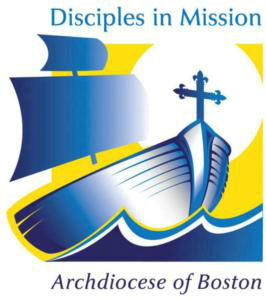Phase III parochial vicars checking in
Monday, May 11 and Tuesday, May 12, parochial vicars who will serve in 17 phase III collaboratives came to the Pastoral Center to prepare for the June inauguration of the new collaboratives. This was a diverse group ranging from 47 years ordained to two years; seven are, or have been pastors, two are or have been parish administrators, and two are currently serving in a collaborative.
The first day focused on evangelization. Patrick Krisak, director of Parish Training and Support and his team led the day. Speaking about the new evangelization he said, "Disciples in Mission is all about fulfilling the great commission ("Go, make disciples..." Mt 28:19). We've been leading up to the new evangelization since Vatican II."
When asked what they desire for their parishes and for the people in their parishes, responses gave evidence of the parochial vicars' faith, hope, and courage: a close relationship with God; more people in the pews; more young people in the pews; that they know that God loves them and they share this good news. One priest commented that he would like to challenge parishioners to bring the parish more to the center of their lives than out on the periphery.
Parochial vicars currently serving in collaboratives joined the group to share their experience and answer questions: Father Tom MacDonald from the Dorchester collaborative of St. Ann and St. Brendan Parishes; Father Martin Dzengeleski of the Billerica collaborative of St. Andrew, St. Mary, and St. Theresa Parishes; and Father Gerald Souza, currently in the Billerica collaborative but moving to the South Boston collaborative of St. Monica-St. Augustine, St. Peter, and St. Vincent de Paul. Father MacDonald, ordained in 2013, noted that in his briefly priestly life, multiple-parish ministry is his only experience. All three priests acknowledged that there are challenges, especially getting to know people, but they also expressed the benefits of living in a rectory with other priests. They spoke about the grieving process that parishes feel when their pastor moves and the fear that their parish will be absorbed by the larger or more financially sound parish in the collaborative.
After evening prayer and dinner, discussion centered on the evangelizing parish. Michael Lavigne, director of the Office of Life Long Faith Formation and Parish Support, asked, "What makes an evangelizing parish?" Although they were nearing the end of a very long day and the sun had long set, the priests came up with an extensive list of key elements. An evangelizing parish has a welcoming team; is a place of prayer in addition to Eucharist; makes good use of media; makes people feel that we walk with them; is outward looking; offers more times for confessions; liturgies are planned, not done "on the fly"; the staff is happy to be there; the physical plant is inviting; it is rooted in Eucharist and there is quality music ministry. One priest cautioned, "Some parishes think they're welcoming, but they're not!"
The need to communicate and over-communicate, with clarity, was the final message of the night.
After closing prayer, the day was done. Evening came and morning would soon follow, the first day.
Lucille Smith from Catholic Leadership Institute (CLI) led training on the second day. This session focused on understanding what a collaborative is and the role of the parochial vicar within this new model. Asked to come up with their own definition of collaborative, one priest quoted the late Bishop John Boles who once said, "We can do more things and do them better, together, than we can do on our own." A priest suggested that a good method of operation is "Listen, learn, reflect; listen, learn, propose." The exercise was beneficial. Thinking that collaboratives were only about the shortage of priests, one participant said that he not only understands the plan better now, but he intends to share this understanding with parishioners.
Some weeks ago, the priests completed an online, confidential, questionnaire to help them gain insight into styles of behavior and personality. Looking at their individual profiles, the priests acquire better understanding of their leadership style. The goal is not to paint the participant into a corner, extrovert or introvert, end of story. The goal is to develop skills to work effectively as leaders within the collaborative. CLI cautions: "Because you might be disposed to act one way does not mean that you cannot choose to act in another."
Evening came and morning soon followed, the second day. These parochial vicars will return next week, with the soon-to-be phase III pastors, for training together. Stay tuned -- and keep the prayers coming!
SUSAN ABBOTT IS COORDINATOR OF PARISH OUTREACH FOR THE ARCHDIOCESE OF BOSTON'S OFFICE OF PASTORAL PLANNING.
- SUSAN ABBOTT IS EVANGELIZATION ASSOCIATE, OUR LADY OF GOOD VOYAGE SHRINE.



















